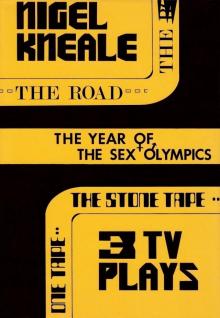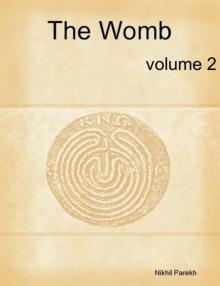The Year of the Sex Olympics and other TV Plays


Author: Nigel Kneale
Category: Other2
Published: a long time ago
Series:
View: 189
Read OnlineBY THE CREATOR OF QUATERMASS
Three of Nigel Kneale’s science-fantasy plays for television are here published for the first time. Author of the pioneering “Quatermass” serials, Mr. Kneale shows here the same mastery of suspense and unrivalled ability at employing science fiction and supernatural themes in TV drama.
“The Road” is set in 1770 and concerns the conflict between an early scientific investigator and a philosopher as they come face to face with terrifying supernatural phenomena in a haunted wood.
“The Stone Tape”, surely one of the finest of 20th century ghost stories, also concerns the scientific investigation of a haunting, this time by a modern electronics research team at their newly acquired headquarters, an ugly Victorian mansion built on even older foundations . . .
The title play, in sharp contrast, is concerned entirely with the future and, in particular, that of television. Mr. Kneale envisages a “cosy and comfy” highly automated society when the problems of war and over-population have been successfully overcome by “Apathy Control”. “Low-drive” people (the bulk of the world’s population) spend their waking hours watching TV and such shows as Sportsex and the Hungry-Angry Show, produced by the “high-drive” personnel of “Output”. With relentless build-up of suspense, “The Year of the Sex Olympics” describes the discovery of a new breakthrough towards better apathy control. A controversial play when first shown in 1969, its underlying thesis—the addictive power of TV—is still being hotly debated and it remains a most vital contribution to the literature of modern communications.
Three of Nigel Kneale’s science-fantasy plays for television are here published for the first time. Author of the pioneering “Quatermass” serials, Mr. Kneale shows here the same mastery of suspense and unrivalled ability at employing science fiction and supernatural themes in TV drama.
“The Road” is set in 1770 and concerns the conflict between an early scientific investigator and a philosopher as they come face to face with terrifying supernatural phenomena in a haunted wood.
“The Stone Tape”, surely one of the finest of 20th century ghost stories, also concerns the scientific investigation of a haunting, this time by a modern electronics research team at their newly acquired headquarters, an ugly Victorian mansion built on even older foundations . . .
The title play, in sharp contrast, is concerned entirely with the future and, in particular, that of television. Mr. Kneale envisages a “cosy and comfy” highly automated society when the problems of war and over-population have been successfully overcome by “Apathy Control”. “Low-drive” people (the bulk of the world’s population) spend their waking hours watching TV and such shows as Sportsex and the Hungry-Angry Show, produced by the “high-drive” personnel of “Output”. With relentless build-up of suspense, “The Year of the Sex Olympics” describes the discovery of a new breakthrough towards better apathy control. A controversial play when first shown in 1969, its underlying thesis—the addictive power of TV—is still being hotly debated and it remains a most vital contribution to the literature of modern communications.
List Chapter or Page:
Page 1Page 2Page 3Page 4Page 5Page 6Page 7Page 8Page 9Page 10Page 11Page 12Page 13Page 14Page 15Page 16Page 17Page 18Page 19 View More >> The Paranormalist- Servants of the Endless Night
The Paranormalist- Servants of the Endless Night Shameless: A Reverse Harem Fantasy Romance (The Carnal Court Book 3)
Shameless: A Reverse Harem Fantasy Romance (The Carnal Court Book 3) The Womb - Poems on Mother , Father , Children , Parenthood - volume 2
The Womb - Poems on Mother , Father , Children , Parenthood - volume 2 Seduced by Her Rebel Warrior
Seduced by Her Rebel Warrior What the Fly Saw
What the Fly Saw Princes of the Underworld
Princes of the Underworld The Wrong Boy
The Wrong Boy Royals and Realms (Vampires of Crescent Cape Book 4)
Royals and Realms (Vampires of Crescent Cape Book 4)